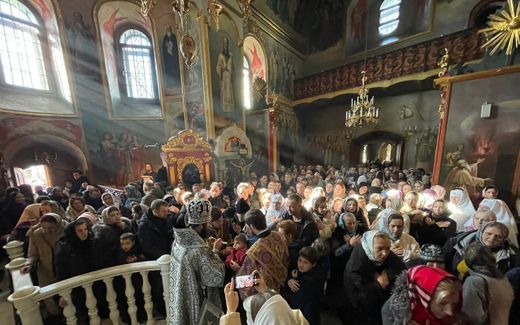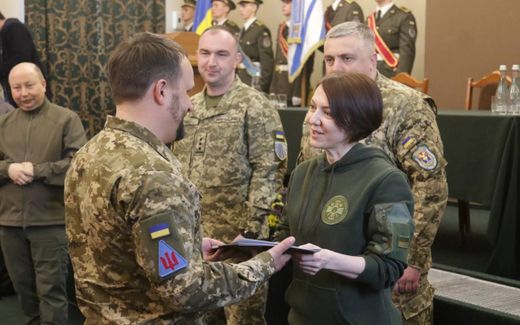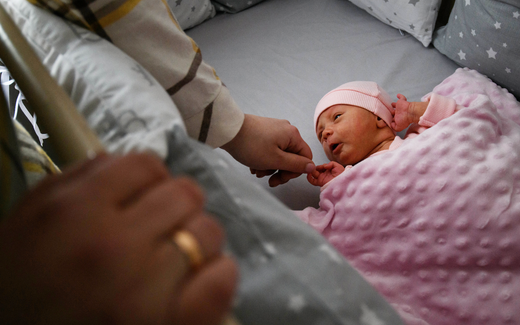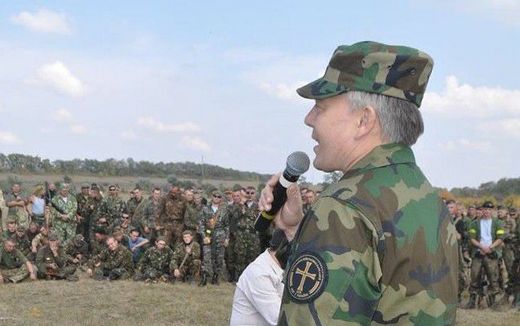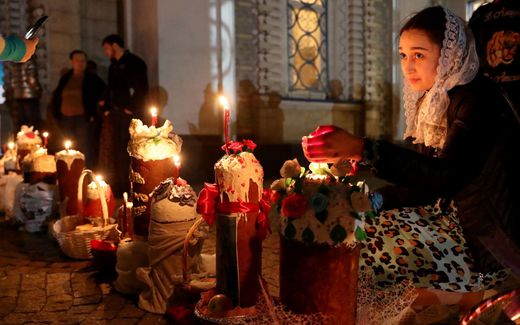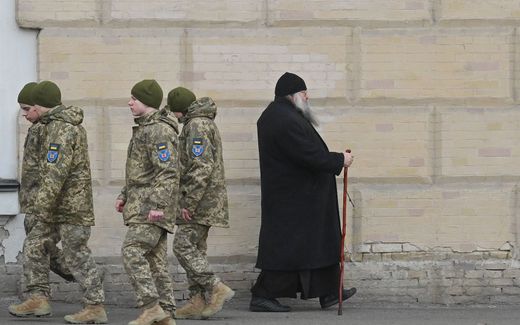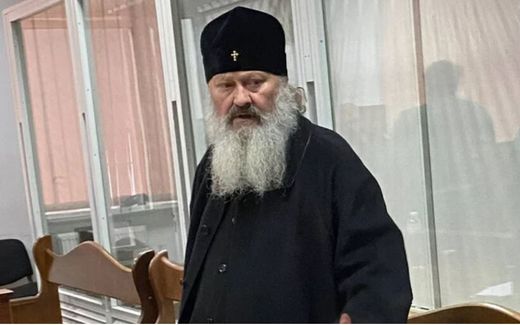Rivalling Orthodox Ukrainians start to fight physically
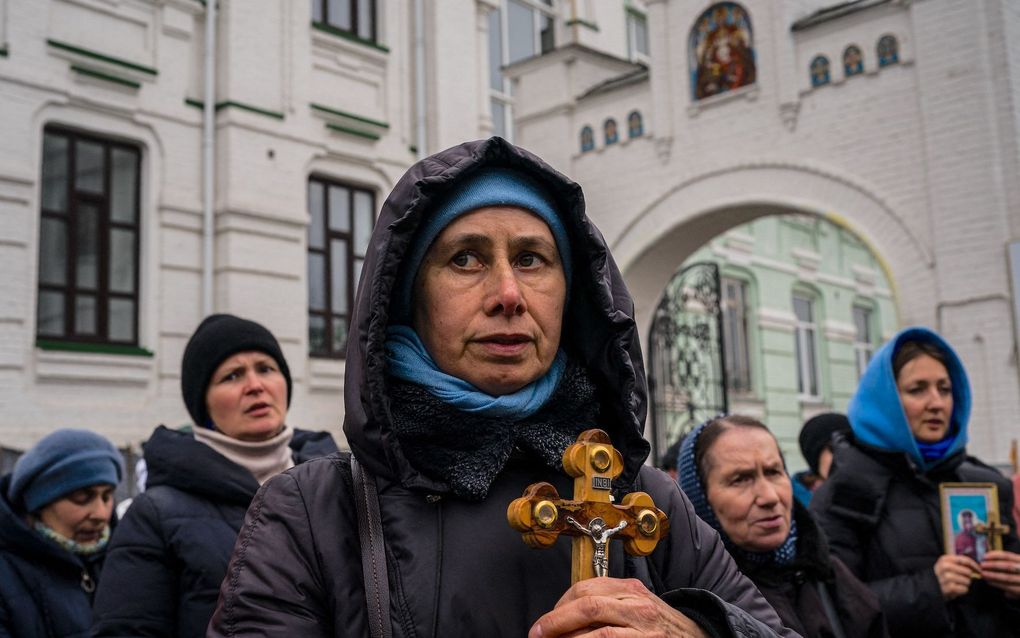
Believers of the Ukrainian Orthodox Church (UOC) pray outside the historic Kyiv-Pechersk Lavra monastery. The government is in a fight with the church about the Lavra complex in the capital. Photo AFP, Dimitar Dilkoff
Eastern Europe
Tensions between the two rival Orthodox churches in Ukraine have now risen to the point where members are fighting each other physically.
Last Monday, late in the evening, the bishop of the Ukrainian Orthodox Church (UOC, Moscow Patriarchate) in the western region of Ivano-Frankivsk was attacked. Police have opened criminal proceedings, the BBC Ukraine reported Tuesday.
There have been several more local conflicts. Young men in balaclavas used tear gas to force the UOC out of a church in Ivano-Frankivsk, in the country's west. In the nearby Khmelnytskyi, a group of local people voted to transfer the cathedral from the UOC to the newly formed Orthodox Church of Ukraine (OCU). Two days later, Khmelnytskyi regional council prohibited the UOC's operation in the region.
In Kamyanets-Podilsky (in the southwest), activists of the OCU tried to occupy the cathedral last Monday. By doing that, it also came to fights, as the Orthodox Journalists report. They also published videos of some incidents.
Most of the fights have to do with the property. The UOC is the traditional Orthodox church in the country and owns the most prestigious buildings. OCU communities demand those churches, usually with the support of the municipal councils.
The Primate of the UOC, Metropolitan Onufry, answered that the believers had the right to defend their property, but with dignity and holiness, according to the Orthodox Journalists.
Illegal constructions
In the capital Kyiv, the government revoked the 10-year-old agreement for the Ukrainian Orthodox Church (UOC, affiliated with the Moscow Patriarchate) to rent the state-owned Kyiv Pechersk Lavra (Monastery of the Caves), claiming some constructions had been built on the site illegally.
In the background lives the suspicion that the UOC is not only (on paper) connected to the Moscow Patriarchate (MP) but also loyal to Russia at heart. In fact, the UOC has continually supported the Ukrainian position in the war against Russia. Two Norwegian experts confirmed this week in the newspaper Vart Land that the "majority" of the UOC stands on the side of Ukraine.
The UOC did not fully comply with the 29 March deadline to leave. In response, Lavra's UOC abbot Metropolitan Pavlo faced a criminal case. A court placed him under house arrest for 60 days in his apartment 50 kilometres from the monastery.

On 1 April, the Ukrainian security service published a compilation of Metropolitan Pavlo's tapped phone calls, in which he claimed that "[local] people are happy" with Russia's occupation of Kherson and claimed Russia's renewed invasion of Ukraine was a "war between America and Russia until the last Ukrainian dies". Metropolitan Pavlo also repeated Russian propaganda disinformation about alleged (and non-existent) "US biolabs" in Ukraine "provoking" Russia's invasion.
Forum18 explains that the government backs a rival Orthodox jurisdiction. "In Ukraine, there will be only the Orthodox Church of Ukraine," a presidential aide declared. He refers to the newly-founded OCU, affiliated with another Patriarchate in Constantinople. In the Orthodox church concept, having two churches with the same identity is very difficult. Even the Ukrainian government thinks it has to choose between the two denominations.
The UOC brought a case to Kyiv Economic Court, demanding that it find the government's decision invalid. The court hearing is due to start on 24 April.
The Lavra has been the location since the 1990s of Kyiv Theological Academy and Seminary, a UOC male monastery, and the UOC central eparchy and administrative departments. In 2013, the government decided to rent the UOC a set of Lavra properties indefinitely and made a rental agreement stating this.
Cathedral
Metropolitan Epiphany, head of the rival Orthodox Church of Ukraine (OCU), stated in a January interview that his church would eventually gain exclusive use of the Lavra. The government has already given the OCU the right to conduct services at the Lavra's Assumption Cathedral and registered the OCU's monastery at the Lavra.

In the Ukrainian Parliament, there is a bill to prohibit the operation of religious organisations affiliated with "centres of influence of religious organisations or associations with ruling centres" in Russia. This is meant to be a ban on the UOC. The full Parliament still needs to consider the draft law.
Forum 18 questions whether the state should use its power to intervene in inter-Orthodox conflicts and to compel or force the Lavra monks to join the OCU under the threat of expulsion from the monastery or to replace one Orthodox community with another based on the government's preferences.
Forum 18 refers to the European Court of Human Rights in Strasbourg, stating that "the Court does not consider that, in democratic societies, the State needs to take measures to ensure that religious communities remain or are brought under a unified leadership".
Neither can the state limit the freedom of religion or belief, even not "during times of national emergency threatening the life of the nation", Forum 18 writes, referring to the UN Human Rights Committee.
Related Articles


